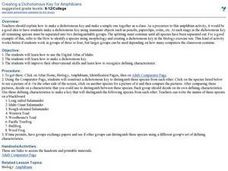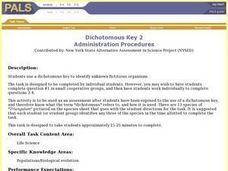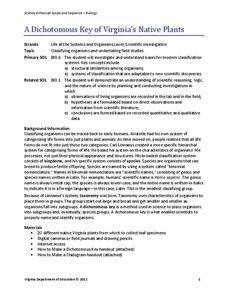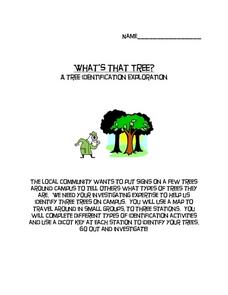Captain Planet Foundation
Which Plant Is Which?
Learn about dichotomous keys, plant identification, and how to care for the planet with a lesson plan that includes several hands-on and innovative activities. Kids go on a plant scavenger hunt and classify the plants that they find...
Kenan Fellows
Use of Dichotomous Keys to Identify Stream Organisms
What kind of organisms are living in the stream? After an explanation on how to use a dichotomous key, groups of three to four use the keys to identify macroinvertebrates from a local freshwater stream. Using the the concept of...
Curated OER
Dichotomous Keys
Students define the word dichotomous and explain why a dichotomous key is a useful tool in identifying different species. Then they look up words they are unfamiliar with or mollusk reference books so students can
learn the names of...
Curated OER
Introducing the Use of Dichotomous Keys to Students
Young scholars are introduced to the use of dichotomous keys as a simple means of beginning scientific observations in nature. They comprehend how to use a dichotomous key. Students distinguish characteristics of a group of organisms....
Curated OER
Creating a Dichotomous Key for Amphibians
Students are introduced to the purpose of dichotomous keys and create one together as a class. In groups, they use a digital atlas to examine the different types of amphibians in Idaho. Using this information, they make their own...
Curated OER
Discovering Dichotomous Keys
Young scholars become familiar with the structure and use of dichotomus keys. They demonstrate a comprehension of the fundamental principles of taxonomy by classifying organisms from a local ecosystem. Students are introduced to the...
Curated OER
Dichotomous Key
Learners draw comparisons between organisms. They classify organisms. Students are introduced to dichotomous keys and how to create and use a dichotomous key to identify a variety of objects. They begin by defining classification, and...
Curated OER
Dichotomous Key 2
Students use a dichotomous key to identify unknown fictitious organisms in an assessment designed to be used after a discussion on the use of a dichotomous keys has occurred. Follow up questions about key included.
Curated OER
"Finding Your Sweet Tooth"--An Introduction to the Dichotomous Key
Sixth graders classify candy according to observable characteristics. They use a dichotomous key to identify their bag of "treats." Thus, describe how dichotomous keys help to the identifying of organisms. Design a self-generated...
ARKive
Species Discovery
How do you classify a newly discovered species? Learners view a presentation and complete research about biodiversity and the classification hierarchy. The lesson includes activities with dichotomous keys and work on classifying both...
Curated OER
Classification Schemes
Junior biologists journey through the hiearchy of living things with these activites. Using a dichotomous key, they identify common algae, plants, and fish. They design their own key for a mixture of seeds and a collection of...
Curated OER
Classification, Keys, and Phylogenetci Trees
Students analyze relationships about animals and create a model of classifications based on both the similarities and the differences. They also discuss a dichotomous key before they create a cladograph using different types of candy.
Curated OER
Desinging and Using a Dichotomous Key
Young scholars are examine the purpose of dichotomous keys. In groups, they design their own in order to describe the characteristics of plants and weeds native to California. To end the lesson, they define new terminology associated...
Curated OER
Creating a Dichotomous Key for Families of Idaho Butterflies
Students are shown how to use the butterfly section of the Digital Altals of Idaho. They discuss how to make a dichotomous key. Students use their skills of observation and recognize defining characteristics that distinguish different...
Curated OER
Building a Dichotomous Key
Young scholars analyze how a dichotomous key helps us explain and identify unknown organisms. They design and construct a dichotomous key, developing a list of three observable characteristics per organism.
Curated OER
The Sky and the Dichotomous Key
Pupils use a dichotomous key to distinguish between different types of clouds
Curated OER
Dichotomous Key
Eighth graders use a dichotomous key to identify unknown fictitious organisms. They work individually during this exercise. The task is designed to take students approximately 15-25 minutes to complete.
LABScI
Taxonomy: Who is in My family?
Find similarities in seemingly unlike organisms. The second instructional activity in a series of 12 builds the concept of a taxonomy and explores the use of a dichotomous key. Learners begin in part one by attempting to group a set of...
NOAA
Vertebrates II
Mammals of the ocean unite! Or not. The 20th installment of a 23-part NOAA Enrichment in Marine sciences and Oceanography (NEMO) program investigates how warm-blooded marine mammals survive in water. In the class activity, learners use...
Science 4 Inquiry
The Classification of Living Things
It's a classification sensation! Demystify why we classify using an inquiry activity that helps your class sort things out. Groups begin by classifying a variety of shoes before they research organisms and design their own dichotomous...
Virginia Department of Education
A Dichotomous Key of Virginia’s Native Plants
Can your class correctly classify plant species? Individuals explore native plants of the local environment and correctly classify them into their respective categories. They investigate differences in the plants and discuss similarities...
Curated OER
Dichotomous Chips
Students create a dichotomous key to different varieties of potato chips. In small groups, they observe and record characteristics of the potato chips to use in the key. They switch keys with another group to see if they can identify an...
Curated OER
Potato chip Classification
Students create a dichotomous key using potato chips. In this classification lesson, students sort potato chips into groups based on observable characteristics. They record their results to create a dichotomous key in preparation for...
Curated OER
What's That Tree?
Fifth graders identify trees along a nature trail. Using a dichotomous key, 5th graders answer questions to aid in their identification of trees along a specified nature trail. Observations are recorded in their science journals. Sample...























